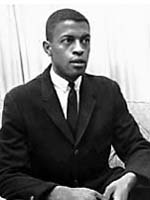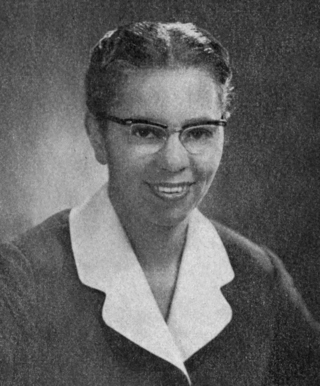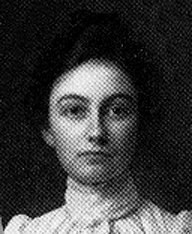
Bennett College is a private historically black liberal arts college for women in Greensboro, North Carolina. It was founded in 1873 as a normal school to educate freedmen and train both men and women as teachers. Originally coed, in 1926 it became a four-year women's college. It is one of two historically black colleges that enroll only women, the other being Spelman College.

Flemmie Pansy Kittrell was the first African-American woman to earn a Ph.D. in nutrition. Her research focused on such topics as the levels of protein requirements in adults, the proper feeding of black infants, and the importance of preschool enrichment experiences for children.
Jibreel Khazan is a civil rights activist who is best known as a member of the Greensboro Four, a group of African American college students who, on February 1, 1960, sat down at a segregated Woolworth's lunch counter in downtown Greensboro, North Carolina challenging the store's policy of denying service to non-white customers. The protests and the subsequent events were major milestones in the Civil Rights Movement.

James Benson Dudley High School is located in the southeastern quadrant of Guilford County in the city of Greensboro, North Carolina. Dudley High School was founded in 1929 as the first black high school in Guilford County, in a school system segregated by law. The school was named for James Benson Dudley.

Ada Jessamine Shumate was an American artist, historian and cartographer, winner of the "Award of Distinction" in 1955 from the Virginia Museum of Fine Arts.

James Benson Dudley was President of North Carolina Agricultural and Technical State University from 1896 until his death in 1925. James B. Dudley High School in the town of Greensboro, North Carolina, where the Agricultural and Technical University is located, was named after Dudley in recognition of his work for his community.

Monica A. Coleman is a contemporary theologian associated with process theology and womanist theology. She is a Professor of Africana Studies at the University of Delaware. She is Faculty Co-Director Emerita for the Center for Process Studies. Her research interests are in Whiteheadian metaphysics, constructive theology, philosophical theology, metaphorical theology, black and womanist theologies, African American religions, African traditional religions, theology and sexual and domestic violence and mental health and theology.
Elreta Melton Alexander-Ralston was a mid-twentieth-century black female American lawyer and judge in North Carolina at a time when there were only a handful of practicing female or black lawyers in that state. With an unusual career as a trial attorney and North Carolina District Court Judge, she has been noted for her “refusal to allow the circumstances of her birth, the realities of her time, and the limitations imposed by others define her destiny.” However, notwithstanding her accomplishments, Judge Alexander's legacy has remained largely unrecognized and her story untold. This confirms the notion that black women lawyers have received minimal universal recognition for their accomplishments and contributions to the legal profession.

David Leinail Richmond was a civil rights activist for most of his life, but he was best known for being one of the Greensboro Four. Richmond was a student at North Carolina A&T during the time of the Greensboro protests, but never ended up graduating from A&T. He felt pressure from the residual celebrity of being one of the Greensboro Four; his life was threatened in Greensboro and he was forced to move to Franklin, NC. Eventually, he moved back to Greensboro to take care of his father. Richmond was awarded the Levi Coffin Award for leadership in human rights by the Greensboro Chamber of Commerce in 1980. Richmond seemed to be haunted by the fact that he could not do more to improve his world, and battled alcoholism and depression. He died in 1990 and was awarded a posthumous honorary doctorate degree from North Carolina A&T

Willa Beatrice Player was an American educator, college administrator, college president, civil rights activist, and federal appointee. Player was the first African-American woman to become president of a four-year, fully accredited liberal arts college when she took the position at Bennett College in Greensboro, North Carolina.
Kate Vixon Wofford was an educator from South Carolina. In 1922, she became the first woman in the state to hold elected office when she was elected superintendent of schools of Laurens County.

Wilhelmina Marguerita Crosson was an educator and school administrator known for her innovative teaching methods. One of the first African-American female schoolteachers in Boston, she developed the city's first remedial reading program in 1935, and was an early advocate of black history education.
Louise Nixon Sutton was a mathematician. She was the first African-American woman to be awarded a PhD in mathematics education by New York University, and the first chair of the Department of Physical Sciences and Mathematics at Elizabeth City State University.
Eva Katherine Hamlin Miller was an artist from Greensboro, North Carolina. She grew up in New York City and studied at the Pratt Institute in Brooklyn, New York; Columbia University, the Graduate School of Fine Art in Florence and the University of Ibadan in Nigeria before moving to North Carolina.
Dixie Lee Bryant (1862–1949) was a geologist and educator.
Etta Christine Leath Gravely is an associate professor of chemistry education at North Carolina A&T State University in Greensboro, North Carolina.

Ione Holt Grogan was an American academic, mathematician, and educator. She worked as a schoolteacher in North Carolina and Georgia for twenty-two years before joining the faculty at the Woman's College of the University of North Carolina, where she was a professor of mathematics from 1935 to 1958. A dormitory, a residence college, and a scholarship at the University of North Carolina at Greensboro, are named after her. Grogan was also the president of the Reviewers Club, the oldest literary club for women in North Carolina.

Cornelia Strong was an American academic, astronomer, and mathematician. She was a professor at the Woman's College of the University of North Carolina, where she taught mathematics and astronomy, from 1905 to 1948. Strong founded the astronomy program at the Woman’s College in 1931. A residence hall and a residential college at the University of North Carolina at Greensboro, as the Woman’s College was later named when it became a coeducational institution, were named in her honor.

Natalie S. Murdock is an American politician and a Democratic member of the North Carolina Senate. Upon being sworn in, she became the first black woman under the age of 40 to serve in the NC Senate.

Constance Hill Marteena was an American librarian and author, known for her bibliographies about Black women.












